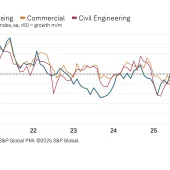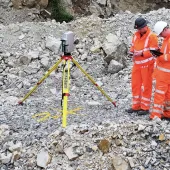MPA highlights key shortcomings in infrastructure planning

Mineral Products Association concerned about the lack of a strategic approach to the supply chain
THE Mineral Products Association (MPA) has highlighted key supply chain issues in its response to the National Infrastructure Commission (NIC) consultation ‘National Infrastructure Assessment: Congestion, Capacity, Carbon – Priorities for National Infrastructure’.
The MPA’s key concern is the continuing lack of any integrated consideration of the supply chain implications of infrastructure ambitions within the draft National Infrastructure Assessment (NIA) or more generally within government.
The Association points out that the implementation and maintenance of infrastructure projects over the next 20 years is likely to require 2 billion tonnes of aggregates and mineral products.
However, without a strategic approach supporting the future supply of aggregates and mineral products, which is integrated with infrastructure, housing and construction objectives within government and among stakeholders, there is no guarantee that projects can be delivered in the medium to long term.
The MPA says the NIC and NIA should recognize the significance of such supply chain issues and help stimulate a more strategic consideration of how to integrate long-term supply chain implications with project and programme delivery.
A related concern highlighted by the MPA is the dismissive attitude of the NIC to rail freight.
The NIC consultation uses a simplistic metric that ‘reducing road freight by one-third would require more than a three-fold increase in rail freight capacity, which simply could not be accommodated on today’s busy railway’ to define the significance of rail freight, and goes on to suggest that truck platooning is a more viable option for freight movements.
The MPA says this viewpoint ignores the significant benefits resulting from the delivery of some 20 million tonnes of aggregates and other mineral products by rail for infrastructure and construction customers.
The integrated rail, wharf and road infrastructure reduces carbon emissions, road congestion and improves air quality and road safety in the delivery of aggregates, other mineral products and construction materials. It also meets the demands of construction and infrastructure clients for more sustainable supply chains.
While there will be inevitable constraints on the role of rail freight, the MPA says the NIA should adopt a more positive approach to the benefits of rail freight in the foreseeable future.
Moreover, the implication in the consultation that rail freight is of little consequence compared with future road platooning of lorries needs to tempered with a more practical appreciation that this modal shift is unlikely to be practical or sustainable for many existing rail freight users in the reasonably foreseeable future.
In particular, the MPA says the use of rail and water to deliver bulk materials required for construction and infrastructure projects is likely to remain a significant element of sustainable supply chains.
Commenting on the consultation, Nigel Jackson (pictured), chief executive of the MPA, said: ‘The critical role of supply chains such as mineral products is persistently overlooked by the NIC and the Government when outlining ambitious plans for future infrastructure and housing investment.
‘Unless there is more strategic awareness and recognition of the role of supply chains such as mineral products in the delivery of infrastructure, housing and other development, we will not achieve the most sustainable long-term supply to these projects.
‘The blinkered attitude towards the benefits of rail freight just serves to emphasize the lack of awareness of the supply chain permeating the consultation. This needs to change as a matter of urgency; supply should never just be assumed.’









